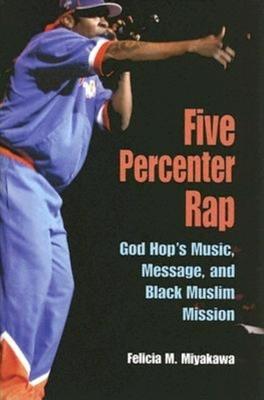"Few books on popular music treat their subject so comprehensively, with thoughtful attention to ideology, history, and verbal and musical rhetoric. Miyakawa's approach is at once comprehensive and streamlined, making for an especially effective presentation of the issues as well as a good read." --Albin Zak, author of The Poetics of Rock: Cutting Tracks, Making Records
"Miyakaya provides a great deal of information and analysis that is impossible to come by elsewhere. A sterling example of culturally-engaged musicology, her book is also a significant contribution to American history." --Joseph Schloss, author of Making Beats: The Art of Sample-Based Hip-Hop
The Five Percent Nation is a controversial organization and a substantial cultural force. Also known as Five Percenters, this offshoot of the Nation of Islam has employed commercial rap, or "God Hop," to teach its beliefs, comment on relevant issues, and recruit new members. Rap artists such as Erykah Badu and Queen Latifah are past members of the Five Percent Nation; GURU and Wu-Tang Clan are currently affiliated.
Five Percenter Rap: God Hop's Music, Message, and Black Muslim Mission examines the phenomenon from musical, historical, and cultural perspectives. Such a kaleidoscopic approach is necessary given the Five Percent Nation's complex theology--grounded in Black Muslim traditions, black nationalism, Kemetic (ancient Egyptian) symbolism, Masonic mysticism, and Gnostic spirituality--its historical ties to major movements and moments in American history, and its deep involvement with popular culture.
After establishing the theological and historical underpinnings of Five Percenter Rap, Felicia Miyakawa considers its marketing approaches and its use of specific musical techniques such as sampling, groove, and layering (often in significant numerical groupings). These techniques, she argues, are in service to the greater goal of Five Percenter rappers, who see themselves primarily as teachers and as bringers of a specific type of redemption and self-knowledge to benighted souls.
Vividly written and solidly researched, Five Percenter Rap will appeal to readers interested in popular music, American music and history, and African American religion and culture.

Five Percenter Rap: God Hop's Music, Message, and Black Muslim Mission
"Few books on popular music treat their subject so comprehensively, with thoughtful attention to ideology, history, and verbal and musical rhetoric. Miyakawa's approach is at once comprehensive and streamlined, making for an especially effective presentation of the issues as well as a good read." --Albin Zak, author of The Poetics of Rock: Cutting Tracks, Making Records
"Miyakaya provides a great deal of information and analysis that is impossible to come by elsewhere. A sterling example of culturally-engaged musicology, her book is also a significant contribution to American history." --Joseph Schloss, author of Making Beats: The Art of Sample-Based Hip-Hop
The Five Percent Nation is a controversial organization and a substantial cultural force. Also known as Five Percenters, this offshoot of the Nation of Islam has employed commercial rap, or "God Hop," to teach its beliefs, comment on relevant issues, and recruit new members. Rap artists such as Erykah Badu and Queen Latifah are past members of the Five Percent Nation; GURU and Wu-Tang Clan are currently affiliated.
Five Percenter Rap: God Hop's Music, Message, and Black Muslim Mission examines the phenomenon from musical, historical, and cultural perspectives. Such a kaleidoscopic approach is necessary given the Five Percent Nation's complex theology--grounded in Black Muslim traditions, black nationalism, Kemetic (ancient Egyptian) symbolism, Masonic mysticism, and Gnostic spirituality--its historical ties to major movements and moments in American history, and its deep involvement with popular culture.
After establishing the theological and historical underpinnings of Five Percenter Rap, Felicia Miyakawa considers its marketing approaches and its use of specific musical techniques such as sampling, groove, and layering (often in significant numerical groupings). These techniques, she argues, are in service to the greater goal of Five Percenter rappers, who see themselves primarily as teachers and as bringers of a specific type of redemption and self-knowledge to benighted souls.
Vividly written and solidly researched, Five Percenter Rap will appeal to readers interested in popular music, American music and history, and African American religion and culture.